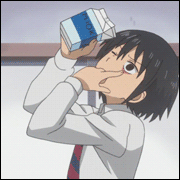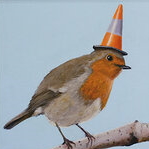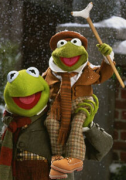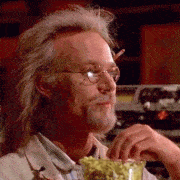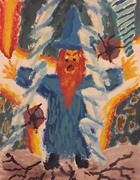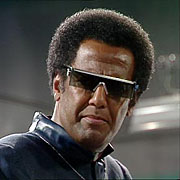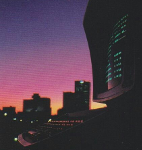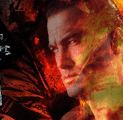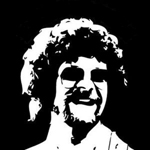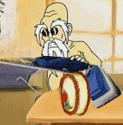|
Shampoo posted:Does anyone here read the Science Fiction Anthology magazines? Asimov's Science Fiction, Jim Baen's Universe, Analog, and Orion are the ones I can think of off the top of my head. Seems like they might be a source for new stuff, but I never thought about reading them before. I used to read Asimov's a few years ago - there were a few gems (a story about a lonely sci-fi nerd in the 1960s who gets abducted by aliens, but ends up loving it, and a story about some a bar on Mars in some retro-future where the British owned the planet and a Gaia religion took over both stick to mind) but largely I was kind of disappointed.
|
|
|
|

|
| # ? Apr 27, 2024 15:09 |
|
Niven's Known Space stuff fits well in this genre.
|
|
|
|
I actually was just going to bring that up, since I just started reading Juggler of Worlds. Actually, I think a lot of Niven's stuff fits well in space opera; even though it's "hard sci-fi", stuff like Ringworld and the Smoke Ring or the Man-Kzin Wars are essentially the definition of space opera.
|
|
|
|
Chairman Capone posted:I actually was just going to bring that up, since I just started reading Juggler of Worlds. Actually, I think a lot of Niven's stuff fits well in space opera; even though it's "hard sci-fi", stuff like Ringworld and the Smoke Ring or the Man-Kzin Wars are essentially the definition of space opera. That's a good point. The Known Space series is very Operatic. Speaking of which, whatever happened to Niven? All he does is collaborations with authors I've never heard of, and none of them ever seem that good. I love his old stuff from the 70s, but can't get behind his latest works.
|
|
|
|
I don't get the hate for Consider Phlebas. What I always thought would be awesome would be to have someone who knew absolutely nothing about the culture series or that such a series even existed (since that would give them a hint as to the outcome of the novel) and let them read it. Horza's feelings give the impression that the Culture are completely deserving of his hate and are on the verge of losing the war. Plus you never really expect a protagonist in a scifi novel to be on the losing side.
|
|
|
|
DanceRobot posted:I don't get the hate for Consider Phlebas. What I always thought would be awesome would be to have someone who knew absolutely nothing about the culture series or that such a series even existed (since that would give them a hint as to the outcome of the novel) and let them read it. Horza's feelings give the impression that the Culture are completely deserving of his hate and are on the verge of losing the war. Plus you never really expect a protagonist in a scifi novel to be on the losing side. That's pretty much what happened to me and I really liked it! I had heard about the Culture series but nothing specific so I went in with a blank slate.
|
|
|
|
I'm halfway through Berserkers: The Beginning, a collection of Fred Saberhagen's short stories about sentient warships whose one and only goal is to wipe out life. Lots of action with some disturbing bits about experiments on human prisoners, the way he describes the Berserkers synthesised voices as snatches of speech from different people the machines had captured is creepy. I've heard that the full length novels aren't as good, though. Shampoo posted:Oh, an oldie but goodie I forgot about are Frederick Pohl's Heechee books. Good call, I've only read Gateway so far, but that was excellent. muscles like this? posted:That's pretty much what happened to me and I really liked it! I had heard about the Culture series but nothing specific so I went in with a blank slate. Same here. I'd never heard of Iain M. Banks before an English teacher lent me her copy of Consider Phlebas, it's still my favourite. That was partly responsible for getting me into sci-fi. Cheers, teacher whose name I cannot remember! it dont matter fucked around with this message at 11:19 on Jun 25, 2009 |
|
|
|
DanceRobot posted:I don't get the hate for Consider Phlebas. What I always thought would be awesome would be to have someone who knew absolutely nothing about the culture series or that such a series even existed (since that would give them a hint as to the outcome of the novel) and let them read it. Horza's feelings give the impression that the Culture are completely deserving of his hate and are on the verge of losing the war. Plus you never really expect a protagonist in a scifi novel to be on the losing side. Yeah I don't understand the other guy's opinion. I've just started reading it - So the protagonist hates the Culture? Ok?
|
|
|
|
Shampoo posted:That's a good point. The Known Space series is very Operatic. Yeah, I was looking over his site and he has six books in the works. Five are collaborations and the other is a collection of short stories and essays. In fact, I'm trying to think of the last book he's done that wasn't either a collection or a collaboration...I think it might have been whatever the last Ringworld book was, five or six years ago. And before that...maybe Destiny's Road from the mid-1990s? That being said, some of his recent stuff I think has been good. Rainbow Mars came out a few years ago; it contained a bunch of stories from the 70s but the main part of the book (the actual Rainbow Mars story) was written for the new collection and I enjoyed a lot (although it originally started out as a collaboration with Terry Pratchett, so maybe it doesn't count fully as his own work). I didn't really think Fleet of Worlds was that great, but I'm around halfway through Juggler of Worlds right now and I'm enjoying it a lot more. Probably because (so far at least) it's not really a sequel to Fleet of Worlds but mostly a retelling/expansion of the various Beowulf Shaeffer stories from the viewpoints of an ARM agent and Nessus (who was always one of my favorite Niven characters).
|
|
|
|
Shampoo posted:Speaking of which, whatever happened to Niven? All he does is collaborations with authors I've never heard of, and none of them ever seem that good. I love his old stuff from the 70s, but can't get behind his latest works. General consensus is that the brain eater got him sometime around the writing of Ringworld Engineers (whether it was before or after RE is a contentious point). I'm guessing that he either ran out of good ideas or just got tired of writing about them.
|
|
|
|
Chairman Capone posted:I actually was just going to bring that up, since I just started reading Juggler of Worlds. Actually, I think a lot of Niven's stuff fits well in space opera; even though it's "hard sci-fi", stuff like Ringworld and the Smoke Ring or the Man-Kzin Wars are essentially the definition of space opera. They could make 100 Man-Kzin Wars collections and I would read them all.
|
|
|
|
I used to love the Man-Kzin Wars volumes, I think I have the first seven or eight. I even loved the ones that most people (I later came to understand) didn't like, such as the one with the warrior puppeteers and plans to make Protectors to fight the Kzinti, or the one where a Kzin scout landed in British India. I reread a couple volumes a year or two back and I was struck at just how truly brilliant the two novellas by Donald Kingsbury were (the ones focusing on Nora Argamentine and Trainer-of-Slaves). Even reading them now as an adult the parts with Nora's diary as she's losing her mind really, really freaked me out. Apparently Niven is also a big fan since some of the stuff that Kingsbury introduced have been adopted by Niven himself as official Known Space continuity. I'm considering reading some of the newer ones but looking them up it seems the past four or five volumes have almost entirely been written by Hal Colebatch or Matthew Joseph Harrington and I'm not really familiar with either of them - are the later ones worth reading, then? Also while maybe the average quality of Niven's work has generally gone down starting in the 1980s, I definitely think he's done good stuff since then. Integral Trees, Smoke Ring, and Legacy of Heorot all came out after Ringworld Engineers and I haven't heard anyone think those were low quality.
|
|
|
|
Seconding In Conquest Born and its sequel The Wilding, both by C. S. Friedman. In Conquest Born is definitely closer to space opera than its follow-up which is more of an adventure story but they're definitely both worth reading if you like space opera. The basic premise is that there's an intergalactic war between two distinct societies: the Braxi, a militaristic caste-society ruled by a steadily dwindling group of ruthlessly bred, genetically superior, infighting nobles; and the Azea, a more democratic society that has genetically engineered its members to harness psychic abilities.
|
|
|
|
Chairman Capone posted:I'm considering reading some of the newer ones but looking them up it seems the past four or five volumes have almost entirely been written by Hal Colebatch or Matthew Joseph Harrington and I'm not really familiar with either of them - are the later ones worth reading, then? I remember remarking on that fact to myself, especially Colebatch who had X entirely to himself, and half of the stories in XI. But he's in there for a reason, they are pretty good. I also liked Paul Chafe's Destiny's Forge, which is a complete novel and has no number. I don't remember Harrington specifically (I binged on them all a while ago so they all blur together) but I don't remember disliking any of them too much. The last one I remember not liking as much, and only because it didn't really fit the tone of the universe, was Gregory Benford's "A Darker Geometry" in like VI and VII. I like Benford and it's a good story, and I really like the idea of the Outsiders generally. But their backstory in those, while it would be a good one in itself, just feels wrong for them somehow, like it's something written for another universe but shoehorned into Known Space. Maybe I just like it better to leave them mysterious. Fortunately I think Niven agrees.
|
|
|
|
I just finished the third book in David Brin's Uplift Series, and I find it incredibly disappointing that he chose to write about a parallel event rather than continue the tale of the Streaker's return home. Not only that, but after checking out Wikipedia it seems that the next three books barely even touch on it until the 6th book. Is this correct? Should I keep reading even though book 3 barely held my attention because I was so curious about what happened in book 2?
|
|
|
|
Fallom posted:I just finished the third book in David Brin's Uplift Series, Most people (me included) find the second Uplift trilogy (Brightness Reef etc.) rather weaker than the first books. The plot doesn't advance very fast, and the big reveal at the end doesn't seem all that significant. Unfortunately though Brin is good at creating tension from darkly-hinted mysteries, he's not so good when he actually has to answer those mysteries. (Some of his short stories show the same effect.)
|
|
|
|
Hobnob posted:Most people (me included) find the second Uplift trilogy (Brightness Reef etc.) rather weaker than the first books. The plot doesn't advance very fast, and the big reveal at the end doesn't seem all that significant. Unfortunately though Brin is good at creating tension from darkly-hinted mysteries, he's not so good when he actually has to answer those mysteries. (Some of his short stories show the same effect.) That's a shame, because he definitely could've used some great recurring characters from the first novel and kept up with the McDevitt-style mysteries-in-space theme.
|
|
|
|
IonClash posted:I'm going to catch hell for this, but I really enjoyed The Saga of the Seven Suns by Kevin J. Anderson. I enjoyed the array of characters and locations. It's 7 books long and covers several alien races, their sub-races, and humans (as well as their separate cultures). It's a bit daunting to keep track of, and KJA likes to flip-flop between characters/locales quite a bit. They were still an enjoyable read though. This was one of the best modern space operas I've read in awhile...KJA is a great author, never read any of his stuff I didn't like. I'm kinda pissed because I never bought the last book and now they've reprinted them, so when I do buy it the spine and cover will be different.  Have to hit a used bookstore I guess. He created a very rich universe there though. Have to hit a used bookstore I guess. He created a very rich universe there though.After reading this thread I'm going to check out Friedman's In Conquest Born. Read this description on Amazon: "The novel is built on the contrast of two protagonists, young people whose talents lead them to the tops of two space-going societies: one militaristic, paranoid and male-dominated; the other pluralistic, with advanced mental powers. The plot follows them from birth to their clash as the two vast space-empires struggle for domination. This is space opera in the best sense: a combination of high-stakes adventure with a strong focus on ideas and characters whose fate an intelligent reader can care about." Sounds very Legend of Galactic Heroes to me, so I'm looking forward to it. Also his book Madness Season was fantastic and it was absolutely criminal when io9 did a "Vampires in Space" list the other day and left it off. (Though they put E.E. Knight's Vampire Earth on there so I can't hate them too much)
|
|
|
|
Point of note: C.S. Friedman is a female, and also responds to emails from fans. One of my friends has been in correspondence with her for years.
|
|
|
|
Astroman posted:After reading this thread I'm going to check out Friedman's In Conquest Born. Read this description on Amazon: "The novel is built on the contrast of two protagonists, young people whose talents lead them to the tops of two space-going societies: one militaristic, paranoid and male-dominated; the other pluralistic, with advanced mental powers. The plot follows them from birth to their clash as the two vast space-empires struggle for domination. This is space opera in the best sense: a combination of high-stakes adventure with a strong focus on ideas and characters whose fate an intelligent reader can care about." The description is a bit misleading, but I think you'll still enjoy it quit a bit.
|
|
|
|
Astroman posted:This was one of the best modern space operas I've read in awhile...KJA is a great author, never read any of his stuff I didn't like. I'm kinda pissed because I never bought the last book and now they've reprinted them, so when I do buy it the spine and cover will be different. Ah, are they all out in paperback? I was waiting to start it until I got the last two, but they weren't out yet and I had such a big stack of other books to read that I pretty much forgot about it. Also while I wouldn't say KJA is a "great" author, I have liked his books despite his faults at least. I think I'm like the only person on the planet who thought the Butlerian Jihad Dune prequels were fun to read.
|
|
|
|
I think KJA is best when he's doing ideas that are his own, not working in an established setting like Dune or Star Wars (although I haven't read any of his X-Files stuff, maybe they're good). But I really liked his Captain Nemo, The Martian War, and War of the Worlds: Global Dispatches.
|
|
|
|
Morlock posted:Peter Hamilton's Night's Dawn trilogy. Great fun except for an incredibly sucky ending that was actually telegraphed all through the books. Except I thought it couldn't possibly be that crap and obvious. Fool that I was. It was worse. He's written other space operas too, but I'm staying off him so someone else will have to oblige.
|
|
|
|
EX-GAIJIN AT LAST posted:Ah, are they all out in paperback? I was waiting to start it until I got the last two, but they weren't out yet and I had such a big stack of other books to read that I pretty much forgot about it. Yeah, I pretty much did the exact same thing with the last book. They're out in new reprints, but the covers are so horrible and plain compared to the beautiful and detailed art of the first printing. His books can be kinda pulpy, but good. Ill Wind was decent apocolyptica, and his Wells and Verne pastiches were fun.
|
|
|
|
How the hell did I miss this thread, I love space operas. A really great series of novels is the Deathstalker series by Simon R. Green. http://en.wikipedia.org/wiki/Deathstalker_%28series%29 quote:The series is set in a far-future, fictional universe, dominated by a vast and powerful human empire that has fallen from its ancient beginnings into cruelty, decadence and oppression. Alien species when encountered are subjugated or exterminated; internal dissent is ruthlessly put down, and power is concentrated in the hands of a psychotic empress (known as the "Iron Bitch") and a number of aristoctratic families, or clans. It has everything I love in good scifi: - Psychics (well more than just psychics like a whole range of people with powers) - Rogue AIs - Epic Space battles - Epic ground battles My friend bought me the first book and I bought the rest, read it cover to cover.
|
|
|
|
Habibi posted:Sure - I've read Night's Dawn, the Commonwealth Saga, and am most of the way through the Void saga. IMO, Hamilton is an amazing author who creates a fantastic universe and characters. On the other hand, his endings tend to be somewhat anti-climactic because they typically wrap things up far too cleanly. In a sense, he's almost the exact opposite of someone like Stephen Eriksson, in that the build-up is incredible and the conclusion lackluster. I love Hamilton, but the ending of Nights Dawn was so terrible, I felt ripped off. 3400 pages for this? The commonwealth saga is really good and so is the void saga. I especially love the dream sections of the void saga. Jet Jaguar posted:I really loved the warchive and the combat armor of Revelation Space. Speaking of Reynolds, I have most of his Conjoiner/Demarchist short fiction in various Dozois "Year's Best Science Fiction" anthologies, but have they ever been published as a whole? He has another collection called Diamond Dogs and Turquoise Days, which is just two short stories, both in the RS universe. Diamond Dogs is excellent, Turquoise Days is a little slow but alright. Finally, Zima Blue is the last collection and it contains the Merlin Saga of stories which has some similarities to the RS universe but is different. The actual story Zima Blue is really good and the ending was a little Actually I'd like to hear some peoples thoughts on some of these if anyone's read them  I'm a ridiculous Reynolds fan. I'm a ridiculous Reynolds fan.
|
|
|
|
Moist von Lipwig posted:Actually I'd like to hear some peoples thoughts on some of these if anyone's read them I've read just about everything that Reynolds has put out there, I'm a big fan as well. I even imported The Prefect and House of Suns because I didn't want to wait for the US release. I'll be honest, my favorite AR book is probably Chasm City. It held my interest much more than Revelation Space did.
|
|
|
|
Regarding the Brin's two Uplift trilogies, I agree that the first is much stronger than the second. However, if you're not a completist or have limited time for reading, you can easily skip Sundiver from the first trilogy. It does give you a bit of back story but nothing that isn't explained clearly in Startide Rising and The Uplift War. I'm not sure what order the former two are actually meant to be read in (IIRC they take place concurrently) but both of them are absolutely amazing and I can't recomend then highly enough. Startide Rising is probably my favorite SciFi book of all time. The second trilogy is very forgettable and I honestly don't remember much about it other than the big reveal at the end which wasn't really that big a deal either. Honestly I think I'd rather if they had never been written as Startide in particular would have been better off with the open ending that it had.
|
|
|
|
Paul Kemp posted:Regarding the Brin's two Uplift trilogies, I agree that the first is much stronger than the second. However, if you're not a completist or have limited time for reading, you can easily skip Sundiver from the first trilogy. It does give you a bit of back story but nothing that isn't explained clearly in Startide Rising and The Uplift War. I'm not sure what order the former two are actually meant to be read in (IIRC they take place concurrently) but both of them are absolutely amazing and I can't recomend then highly enough. Startide Rising is probably my favorite SciFi book of all time. Can you describe what the big reveal is?
|
|
|
|
I know some people don't enjoy this series, but I found Lois McMaster Bujold's Vorkosigan Saga very enjoyable, it treads the fine line between character development/world creation/oh-poo poo space battles pretty well. Bujold has a very keen imagination when it comes to envisioning not just futuristic science but also a plethora of futuristic societies, with their own political and social norms. It really helps that Bujold is a very terse, witty writer, which helped to make the books a lot more entertaining to me.
|
|
|
|
JustNoSkill posted:I know some people don't enjoy this series, but I found Lois McMaster Bujold's Vorkosigan Saga very enjoyable, it treads the fine line between character development/world creation/oh-poo poo space battles pretty well. Bujold has a very keen imagination when it comes to envisioning not just futuristic science but also a plethora of futuristic societies, with their own political and social norms. I enjoyed the Vorkosigan series very much, too. It's well written and really runs the gamut as far as subgenres go. One will be a space pirate type book, then another will be a spy novel, then the next one will be filled with political intrigue and infighting, then you'll have a romance novel. I can't recommend them enough.
|
|
|
|
Fallom posted:That's a shame, because he definitely could've used some great recurring characters from the first novel and kept up with the McDevitt-style mysteries-in-space theme. A fellow McDevitt fan, maybe you can recommend some of his books to me. So far I have only read Seeker and Polaris. But he has so many other ones as well.
|
|
|
|
Toadsniff posted:A fellow McDevitt fan, maybe you can recommend some of his books to me. So far I have only read Seeker and Polaris. But he has so many other ones as well. It'd be easier to say which ones to avoid, since most of McDevitt's books follow the same sort of formula. The Devil's Eye, his most recent one, is disappointing because the big mystery is astonishingly lame once you figure it out, but the story up to that point is pretty decent. Since you've only read Seeker and Polaris, I'd recommend the Priscilla Hutchins books (http://en.wikipedia.org/wiki/Jack_McDevitt) because they offer a different viewpoint on the same universe, with Priscilla being a starship pilot instead of an antiquities dealer.
|
|
|
|
Fallom posted:Can you describe what the big reveal is? I started to reply and actually found that I couldn't. I apparently didn't even read the final book in the second trilogy. I'll have to check it out, maybe it redeems the first two. The big reveal that I remembered is that the humans on Jijo have been secretly breeding horses in contravention of their treaty with the centaur race and reveal them in order to fight the galactics. Come to think of it that may have even happened in the first book of the second trilogy. They just didn't make much of an impression on me and my memory of them is very hazy. It probably helps that when I read the first trilogy I was in early high school and tended to re-read books that I liked multiple times. I probably re-read Startide Rising four times in a two year period.
|
|
|
|
Toadsniff posted:A fellow McDevitt fan, maybe you can recommend some of his books to me. So far I have only read Seeker and Polaris. But he has so many other ones as well. I quite like Moonfall. At least, I should say I liked it maybe 10 years ago, I read it when it first came out and haven't really read it since. It's funny, I actually just got it out from the library today to re-read it, logged on, and saw your post. Anyways hopefully I'll get around to reading it again and it won't be absolutely terrible this time. Some of it I remember as being somewhat stilted, but having some pretty good Deep Impact-type scenes, nuclear rockets flying around, moonbase evacuations, jerry-rigged space suits, and other such genre staples done relatively well.
|
|
|
|
Has anybody read The golden age by John C. Wright? The idea of immortality with the help of nanomachines and heavy use of a futuristic Internet combined with the humanity's lack of interest in doing something else than reprogramming oneself's brain left me with my mouth wide open. This is the kind of future that could actually happen.
|
|
|
|
Chairman Capone posted:I quite like Moonfall. At least, I should say I liked it maybe 10 years ago, I read it when it first came out and haven't really read it since. It's funny, I actually just got it out from the library today to re-read it, logged on, and saw your post. Anyways hopefully I'll get around to reading it again and it won't be absolutely terrible this time. Some of it I remember as being somewhat stilted, but having some pretty good Deep Impact-type scenes, nuclear rockets flying around, moonbase evacuations, jerry-rigged space suits, and other such genre staples done relatively well. I'll second this - Moonfall is silly and written at a McDevitt level, but it's good fun. It certainly delivers what it promises.
|
|
|
|
I'll recommend Allen Steele's Coyote saga. It's got starships, jump gates, political intrigue, pioneers struggling against the elements, and all the other stuff a space opera buff likes. When I got about halfway through the first novel, I immediately went out and bought the other two parts. I've read the first trilogy and the related novel Spindrift. I'm currently reading Coyote Horizon. Here's a fan-made site that will fill you in.
|
|
|
|
Fallom posted:Can you describe what the big reveal is? Since Fall Kemp never finished the second trilogy. If you really want to know: The interstellar travel web is five galaxies, if I remember correctly, anyway they find a ship with a library describing a time when there were more galaxies connected. It proves that the Galactic Library is actually being edited and therefore can be disputed as false, and then one of the galaxies falls off. I loved both trilogies and wouldn't mind reading more of them. Is Brin planning any new books? I haven't seen anything new from him in forever.
|
|
|
|

|
| # ? Apr 27, 2024 15:09 |
|
They're probably harder to find since the series appears to have gone out of print, but Debra Doyle and James D. Macdonald's Mageworlds series is one of my favorite space opera series. The main trilogy (The Price of the Stars, Starpilot's Grave and By Honor Betray'd) is really the best of the lot, but the prequels/sequels they wrote to the series afterward weren't bad either. The prequels/sequels focus mostly on the back story to one of the characters, or upon the children of some of the characters from the trilogy.
|
|
|





